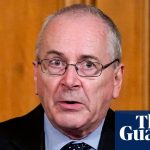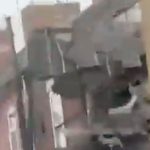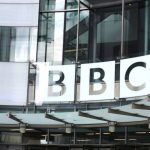Macron left with ‘very little hope’ on US tariffs after meeting Trump
French president Emmanuel Macron has been speaking to the media in the last few minutes, as he concludes his visit to Portugal with a joint press conference with the country’s prime minister Luís Montenegro.
Macron was asked about US president Donald Trump and the prospect of US tariffs on the EU.
He said that he raised this issue with Trump during his meeting earlier this week, but was left “with very little hope” that the issue could be resolved.

Macron blamed it as “misunderstandings” on the part of the US administration, who see the EU’s value added tax as tariffs, which he said was “factually false”.
The French president explained that they apply regardless of the status of the product, whether it is imported or produced locally.
He also warned about side effects of any broader trade disruptions – for example through tariffs on aluminium and steel – coming just at the time as Europeans seek to invest more in their defence efforts, as requested by Trump, as they would hurt interests of both the US and the EU.
He repeated his call to invest more in Europe’s sovereignty and strategic autonomy by reducing external dependencies, and realising its own potential.
Key events
Russia names new US ambassador
As I was listening to Macron, Russia has named career diplomat Alexander Darchiev as its new ambassador to the United States.
It is a sign of thawing relations between the two countries, as Russia had no ambassador to the US since last October amid growing tensions in the aftermath of its illegal invasion of Ukraine.
The Russian ministry of foreign affairs said that Darchiev would leave for Washington “in the near future.”
The two countries have been working on restoring diplomatic ties on the back of the US-Russia summit in Riyadh, and held a follow-up meeting on this specific issue in Istanbul just yesterday.
European focus for London, EU talks is on supporting Ukraine’s defence, security guarantees – Macron
Macron also spoke about the upcoming European defence summit in London this Sunday, and the special European Council summit in early March.
He said the two meetings will be about how Europe can best support Ukraine so it can continue defending itself if needed.
But he also added that should a peace deal be agreed – and only with the approval from Ukrainians – then Europe would still need to provide specific guarantees of lasting security.
In this context, he stressed the work done by France and the UK on “very concrete solutions to maintain and provide security guarantees on the ground,” as they both hinted at potential deployment of peacekeeping forces to Ukraine.
He says the two issues will be discussed again at the London summit on Sunday, which will see representatives of the countries that took part in first talks in Paris “and a few others”.
Macron says reinstating ‘strategic ambiguity’ on European troops helps Ukraine peace talks
Macron also got confronted by a frustrated journalist about Europe’s strategy on Ukraine.
He appeared to suggest that it was a mistake to say at the beginning of the conflict that Europe declared it would at no point commit to sending “boots on the ground, forever.”
“So we had to reinstall that strategic ambiguity,” he said, but pointed that “triggering any escalation would be a big mistake.”
He went on to say:
I think you should not underestimate the fact that three years ago, everybody thought that the landslide victory of Russia was certain … [it] was presented by Russia was a special operation for three weeks.
Three years later, they took some territories, but we cannot present it as a victory for Russia.
He disagreed with a claim that Europe’s strategy did’t work, “especially after some strategic defeats for Russia, with Sweden and Finland joining Nato.”
“This is why we have to resist. This is why we have to help the Ukrainians to put themselves in the best possible situation, to negotiate a solid and longstanding peace,” he said.
Macron left with ‘very little hope’ on US tariffs after meeting Trump
French president Emmanuel Macron has been speaking to the media in the last few minutes, as he concludes his visit to Portugal with a joint press conference with the country’s prime minister Luís Montenegro.
Macron was asked about US president Donald Trump and the prospect of US tariffs on the EU.
He said that he raised this issue with Trump during his meeting earlier this week, but was left “with very little hope” that the issue could be resolved.
Macron blamed it as “misunderstandings” on the part of the US administration, who see the EU’s value added tax as tariffs, which he said was “factually false”.
The French president explained that they apply regardless of the status of the product, whether it is imported or produced locally.
He also warned about side effects of any broader trade disruptions – for example through tariffs on aluminium and steel – coming just at the time as Europeans seek to invest more in their defence efforts, as requested by Trump, as they would hurt interests of both the US and the EU.
He repeated his call to invest more in Europe’s sovereignty and strategic autonomy by reducing external dependencies, and realising its own potential.
Ireland starts crackdown on asylum system abuses with deportation flights to Georgia

Lisa O’Carroll
in Dublin
New Irish justice minister has led the government’s crackdown on what it sees as asylum system abuses, with 32 people deported to Georgia overnight in the first deportation operation under a new contract signed with airlines.
Jim O’Callaghan told RTÉ that “the message is if you are seeking asylum and you are not entitled to asylum don’t come to Ireland”.
O’Callaghan, who came into office a month ago, has said too many people come to Ireland with no right to asylum. Earlier this month he revealed that more than 80% of applications for protection were rejected in January because people did not qualify for asylum status.
Last year it emerged that growing numbers were coming from the UK via Belfast.
The minister said the flight cost more than €100,000 adding there would be more in the future.
Foreign minister Simon Harris said in a social media update that “a fair and firm migration system must ensure deportations are effective and efficient.”
“Today our country recommenced the use of charter flights for deportations. If you don’t have a legal right to be here, our system must act and today is evidence that it is and it will,” he stressed.
Romanian government survives no-confidence vote
Romania’s pro-European coalition government survived a no-confidence vote in parliament on Friday, avoiding further political turbulence in the Nato and European Union member state which will rerun a presidential election this year, Reuters reported.
Tensions have run high in Romania since the election was annulled in December following allegations that Russian interference had propelled far-right NATO critic Calin Georgescu into pole position in the first round.
Analysts had said the three hard-right parties that filed the no-confidence motion – which accused the two-month-old coalition government led by Social Democrat prime minister Marcel Ciolacu of corruption and of losing credibility – had done so to boost their profile before the rerun in May.
The no-confidence motion was supported by 144 lawmakers, short of the 233 votes needed to pass, Reuters said.
Pope Francis no longer in critical condition
Pope Francis’s condition is not currently critical, a Vatican source told AFP news agency, after a series of clinical improvements for the 88-year-old pontiff suffering from pneumonia in both lungs.
A Vatican source said Friday that the “criticality has passed, for the moment”, while cautioning that Francis’s overall condition “remains complex” and his prognosis still “reserved”.
After being hospitalised on 14 February for breathing difficulties, the 88-year-old pontiff’s condition sparked widespread alarm as it deteriorated into pneumonia in both lungs.
But there has been no recurrence of the breathing attack he suffered at the weekend and since then the Vatican has released more optimistic medical updates.
Zelenskyy’s visit to White House – timings
It’s still early morning in Washington, so it may take a while before we get to our main event of the day. We’re expecting Zelenskyy to arrive at the White House around 5pm CET (4pm GMT), with a joint press conference with Trump to follow about two hours later, so 7pm CET (6pm GMT).
But please remember that these timings can and usually do change as talks take more time than expected. Given the tensions between the two leaders, there will be more temptation than usual to read into any delays, too…
Protesters ‘waging battle’ with police in Athens as protests turn violent

Helena Smith
in Athens
The peaceful scenes in central Athens have now been eclipsed by the eruption of full scale clashes between rock-throwing youths and riot police.
The thousands of people who had crammed into Syntagma square have now fled, some even seeking refuge in the parliament, as riot police fire rounds of teargas at hundreds of black-clad hooded youths lobbying rocks at them.
The entire area around Syntagma has become a battle zone with police saying as many as 700 people “are waging battle” with them. The air is so thick with teargas that several people have been seen fainting with Red Cross rescue workers rushing to administer first aid.
It is unclear, at this stage, if this is an eruption of the rage the disaster has triggered, or young anarchists who often hijack peaceful protests. Most believe the latter.
Athens protests turn ugly with clashes with police
Since Helena’s last update, the protests in Athens have turned ugly, with AFP reporting clashes between firebomb-wielding youths and police who fired teargas.
Greeks protest through ‘angry silence’ on second anniversary of Tempe train crash

Helena Smith
in Athens
Over in Athens our correspondent Helena Smith says over the course of many years reporting from Greece she has never seen protest rallies of the magnitude in size or depth of spirit as today (11:29).
People of every age, young and old, had descended, it seems, on and around Athens’ main Syntagma Square but in a first they weren’t screaming themselves hoarse, they weren’t chanting slogans, they stood in silence, in angry silence, in honour of those who had died in a disaster almost everyone believes was preventable.
AFP is reporting that about 300,000 people are taking part in demonstrations, according to police.
On Sunday, UK prime minister Keir Starmer will welcome European leaders to London to debrief and discuss next steps after his, Emmanuel Macron and Volodymyr Zelenskyy’s trips to see Donald Trump at the White House.
Swedish prime minister Ulf Kristersson can’t wait.
He just posted this on social media:
On Sunday I will travel to London to meet with Prime Minister Keir Starmer and other European colleagues to continue discussions on Ukraine and the need for strong international support.
Sweden stands with Ukraine and on the side of freedom. Their security is ultimately also about the security of Sweden and Europe.
Protests in Greece on two-year anniversary of Tempe train crash

Helena Smith
in Athens
Elsewhere, tens of thousands of people are joining protests and strikes as Greece marks the second anniversary of a fatal train crash, the fallout of which has put the prime minister, Kyriakos Mitsotakis, in the line of fire.
As experts attributed the disaster to oversights and major systemic failures, organisers vowed that Friday’s demonstrations, which coincide with nationwide industrial action, would be on a scale not seen in years.
Fifty-seven people, almost all students, were killed, and dozens more were injured when an intercity passenger train collided head-on with a cargo locomotive in the valley of Tempe on 28 February 2023. It was the worst rail accident in Greece’s history.
Not since he first won office in July 2019 has Mitsotakis, a former banker, confronted such unrest. Public anger over the response to the crash – not least a decision to rapidly clean up the site and remove debris that included vital evidence and human remains – has been exacerbated by the perceived and growing sense of a government cover-up.
Trump briefly wanted to cancel Zelenskyy’s visit – French media
The relationship between Zelenskyy and Trump is so fraught that French media are reporting that the US president even allegedly considered cancelling the visit altogether – only to be persuaded by French president Emmanuel Macron.
BFMTV claimed, quoting a diplomatic source, that Trump’s team told Ukraine on Wednesday that the meeting was going to get cancelled, prompting Zelenskyy to speak with Macron, who intervened on his behalf.
Ultimately, the invite was back on the table and so we are expecting to see Zelenskyy at the White House later today – but there will definitely be a sense of nervousness until not only the meeting starts, but until it concludes, with many potential issues that could derail the talks.
But it is notable how Trump’s language on Zelenskyy has shifted after last night’s meeting in Starmer: no longer a “dictator,” the Ukrainian leader was instead praised by the US president.
Let’s see what language we’re going to hear today.
What European papers say
Looking at European papers today, there is a somewhat mixed sentiment about the deal that is expected to be signed later today.
Discussing Starmer’s visit to the White House, German magazine Der Spiegel joked that any meeting with Trump has “nail-biting potential,” as observers “never know how it will end.” “Will he want to annex, integrate, buy something? Or just rename?,” it said.
On the mineral deal, it said that it was increasingly clear that the agreement was not just about the minerals, but “primarily how they want to shape their relationship under president Trump.”
Similarly, French Le Monde said the deal was just “a first step before a comprehensive agreement,” but “remains [the means to] succeed in getting closer to the American president.”
But not everyone is upbeat.
Denmark’s Berlingske criticised the proposed deal in harsher words, calling out that its logic could be seen as “profound disloyalty to the allies in Europe, who have collectively made a greater contribution to the war than the US.”
It noted that the current draft is still better than the initial proposal, but urged caution saying: “The gap between the mineral agreement and Trump’s rhetoric is almost too good to be true. Therefore, there is one message to Ukraine on the day Trump and President Zelensky are to sign the deal: Don’t trust him.”
Poland’s Gazeta Wyborcza also praised Zelenskyy for rejecting the first draft of the agreement, saying it more resembled historical extortion arrangements between the colonisers and the colonised.
“Zelenskyy has not given in to the pressure of Trump’s abuse and defends himself and the interests of the state, driving a hard bargain with the new administration,” it argued.
Putin would ‘keep his word’ on Ukraine peace deal, Trump insists & other key developments
In other key developments on Ukraine:
-
Donald Trump insisted that Vladimir Putin would “keep his word” on a peace deal for Ukraine during his meeting with Starmer. Trump also refused to commit to deploying US forces to support a European-led peacekeeping force.
-
However, Trump reiterated his support for the Nato principle of collective defence under Article 5 of the Nato treaty. He said “I support it. I don’t think we’re gonna have any reason for it. I think we’re going to have a very successful peace.”
-
After their bilateral meeting, Starmer said he had been clear that “the UK is ready to put boots on the ground and planes in the air to support a deal.” He said he was “working closely with other European leaders on this” and that working with allies was “the only way that peace will last”.
-
Kaja Kallas, the EU foreign minister, has accused Donald Trump of falling for a Russian narrative by closing the door on Nato membership for Ukraine. “Why are we in Nato? It is because we are afraid of Russia. And the only thing that really works – the only security guarantee that works – is Nato’s umbrella,” she said.
-
Kallas – a former prime minister of Estonia, which borders Russia – also questioned Trump’s approach to a peace deal. “My question is, why we should give Russia what they want on top of what they have already done – attacking Ukraine, annexing territory, occupying territory, and now offering something on top of it? … Consider here in America that after 9/11 you would have sat down with Osama bin Laden and said ‘OK, what else do you want?’ I mean, it’s unimaginable.”
-
Given the tone of her comments, you will be probably somewhat less surprised to learn that her meeting with US counterpart Marco Rubio got cancelled at a very late notice due to, erm, “scheduling issues” – only after she landed in the US.
-
Russian forces staged mass strikes late on Thursday on energy targets in the Kharkiv region of north-eastern Ukraine, the regional governor said. Oleh Syniehubov said one man was injured in a Russian attack on the town of Balakliia, south-east of Kharkiv. Ukraine’s air force reported threats of attacks by glide bombs and drones in the region.
-
North Korea has sent more soldiers to Russia and redeployed several to the frontline in Kursk, the South Korean spy agency told Agence France-Presse on Thursday. “The exact scale is still being assessed,” an official said.
-
Nato allies to Ukraine are preparing billions more in aid and contributions to security guarantees, the Nato secretary general, Mark Rutte, said on Thursday, adding he had had a great talk with Donald Trump.
Key takeaways from Trump-Starmer meeting
If you want to catch up on the key developments from last night’s meeting between Trump and Starmer, our global affairs correspondent Andrew Roth has this helpful summary for you.
Keir Starmer’s meeting with Donald Trump this week comes at a crucial moment for the war in Ukraine and the future of the Nato alliance. Europe is looking for leaders who can engage Trump on the future of the continent as the US leader appears more inclined to demand tribute from his allies and cosy up to Vladimir Putin.
Can the “special relationship” between the US and the UK save the day? Or has the era of transatlantic cooperation ended in the era of “America first”? Starmer has already established a friendly rapport with Trump and comes bearing promises to raise defense spending and negotiate on trade, but can that overcome Trump’s impulse to abandon Europe and strike a deal with Russia to end the war as quickly as possible?
Morning opening: The Art of the Deal

Jakub Krupa
Ukrainian president Volodymyr Zelenskyy is expected to sign a rare earth minerals deal on a visit to the White House on Friday, even though the host, Donald Trump, has said it will not contain significant security guarantees for Kyiv.
Key details of the agreement have still to be confirmed but it is understood it would establish a joint fund between the US and Ukraine that would receive revenues from the mining of rare earth metals and other precious minerals in Ukraine, as well as some oil and gas revenues. The fund would invest in projects in Ukraine.
Relations between the US and Ukrainian presidents became acrimonious earlier this month after Kyiv and Europe were excluded from US-Russian peace talks and Zelenskyy resisted US pressure to sign a previous version of the deal that he said “10 generations of Ukrainians will have to pay back”.
But on Thursday, meeting with UK prime minister Keir Starmer, Trump distanced himself from previous remarks in which he falsely called Zelenskyy a dictator. “Did I say that? I can’t believe I said that,” he said, before admitting that the relationship between the two men had got a “little testy” over financial support but was now on firmer ground.
In a further sign of a healing relationship between the two, Trump praised Zelenskyy as “very brave” and said he got along with him “really well”.
However he resisted Starmer’s urging to provide firmer security guarantees for Ukraine, instead suggesting the US having a multibillion dollar stake in Ukraine’s rare earths sector with US workers on the ground would be enough of a deterrent for Russia.
He also said that if British peacekeepers were in Ukraine they “don’t need much help” and could “take care of themselves” although he did add “if they need help, I’ll always be with the British”.
We will see if that generally positive tone of the Trump-Starmer meeting carries into Zelenskyy’s much-awaited visit today.
In a sign of growing urgency, Trump said about a peace deal yesterday that “it will be fairly soon or it won’t happen at all.” Let’s look out for further signs of what he means by that.
Zelenskyy is due to arrive at the White House 5pm CET (4pm GMT). I will bring you all the latest throughout the day.
It’s Friday, 28 February 2025, and this is Europe live. It’s Jakub Krupa here.
Good morning.












